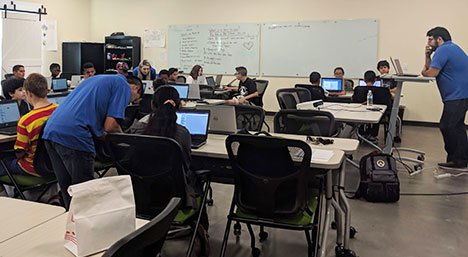Does Your Child Need a Reading Tutor?

Does Your Child Need a Reading Tutor? This pressing question often emerges when parents notice their child grappling with the intricacies of reading. In an era where literacy remains a foundational skill, ensuring that young learners master this essential competency is paramount. As children navigate the early stages of education, identifying potential challenges and providing targeted interventions becomes crucial to set them on a path to academic success.
Children Need a Reading Tutor
The journey of deciphering whether a child requires additional reading support is multifaceted. Through this exploration, we aim to shed light on the signs, strategies, and solutions that guide parents and educators in making informed decisions. By understanding the nuances of reading difficulties and the benefits of specialized tutoring, we can pave the way for every child to embrace the joys of reading, fostering confidence, comprehension, and a lifelong passion for learning.
The Basics of Reading
At its core, reading involves decoding symbols to derive meaning. For children, this process can be intricate, requiring phonetic awareness, vocabulary recognition, and comprehension skills. Each child progresses differently, making individualized attention essential.
Read More: The Importance of a Private Teacher for A Child Education
Signs to Watch For
Often, subtle signs can indicate a child’s reading struggles. These may include avoiding reading aloud, frequent word-guessing, or showing disinterest in books. Recognizing these signs early can pave the way for timely intervention.
Benefits of a Reading Tutor
While parents play an indispensable role, reading tutors bring specialized expertise. They employ tailored strategies, techniques, and resources, ensuring your child receives the targeted help they need to thrive.
Evaluating Your Child’s Needs
Before diving into tutoring, understanding your child’s specific challenges is crucial. Whether it’s phonemic awareness, fluency, or comprehension, a comprehensive assessment lays the foundation for effective intervention.
Common Reading Challenges
From dyslexia to comprehension difficulties, the spectrum of reading challenges is vast. Recognizing these challenges is the first step toward addressing them.
How Tutors Address Challenges
Tutors employ a myriad of techniques, from multisensory approaches to specialized programs, targeting each child’s unique needs. Their expertise ensures a holistic approach, fostering both skill development and confidence.
Selecting the Right Tutor
Choosing a tutor isn’t a one-size-fits-all endeavor. Consider qualifications, experience, teaching methodologies, and compatibility to find the perfect match for your child.
In-home vs. Online Tutoring
With technological advancements, options abound. While in-home tutoring offers personalized interaction, online platforms provide flexibility. Weighing the pros and cons helps determine the optimal approach.
Costs Involved
Investing in your child’s education is invaluable, but budget considerations are inevitable. Understanding cost structures, payment plans, and potential financial aid avenues ensures informed decision-making.
Success Stories
Numerous success stories underscore the transformative power of reading tutoring. Witnessing a child’s journey from struggle to success is both heartening and inspiring.
When DIY Isn’t Enough
While parental involvement is essential, sometimes DIY strategies fall short. Recognizing when external expertise is required ensures your child receives the best support.
Case Studies
Exploring real-life case studies provides insights into tutoring’s tangible impact, offering hope, guidance, and evidence-based perspectives.
The Role of Parents
Parents serve as the primary advocates, motivators, and supporters. Their active involvement, coupled with open communication, amplifies a child’s progress.
Local Resources
Community centers, libraries, and local programs offer invaluable resources. Exploring these avenues can supplement tutoring efforts, enriching your child’s learning journey.
Tools and Apps
Embracing technology can enhance learning experiences. From reading apps to interactive tools, tech solutions offer engaging, effective, and fun learning opportunities.
Academic Impact
Beyond grades, reading skills profoundly influence academic success, confidence, and future opportunities. Prioritizing reading sets the stage for lifelong learning.
Emotional and Social Benefits
Improved reading skills foster confidence, self-esteem, and social interactions. Beyond academics, these skills empower children, shaping their holistic development.
Balancing Tutoring and Regular Schooling
Juggling tutoring sessions with regular schooling demands balance. Effective scheduling, communication with educators, and prioritizing well-being ensure harmonious integration.
Understanding Priorities
First and foremost, understanding your child’s academic priorities is paramount. While tutoring addresses specific challenges, regular schooling provides a comprehensive educational experience. Discuss with your child, evaluate their strengths and weaknesses, and set clear academic goals.
Effective Scheduling
Time management becomes crucial when juggling tutoring sessions and regular classes. Establish a structured timetable that allocates dedicated hours for both activities. Prioritize core subjects and areas of improvement during tutoring, ensuring a balanced approach.
Open Communication
Maintaining open communication channels with educators and tutors fosters collaboration. Share insights, progress reports, and feedback between parties, ensuring everyone remains aligned. This collaborative approach ensures cohesive learning experiences tailored to your child’s needs.
Prioritizing Well-being
Reading Tutor: Amidst academic pursuits, prioritizing your child’s well-being is non-negotiable. Ensure they have adequate breaks, engage in extracurricular activities, and maintain a healthy work-life balance. Recognizing signs of stress or fatigue and making necessary adjustments is essential.
Flexible Approaches
Reading Tutor: Recognize that flexibility is key. Some weeks may demand more intensive tutoring sessions, while others require lighter commitments. Adapt schedules, modify approaches, and remain receptive to your child’s evolving needs.
Read More: A Comprehensive Guide to Home Educating Children
Conclusion
In the intricate journey of determining whether your child needs a reading tutor and subsequently balancing tutoring with regular schooling, one overarching theme emerges: the unwavering commitment to your child’s academic and personal growth.
Throughout this comprehensive guide, we’ve delved deep into understanding the signs of reading challenges, the myriad benefits of tutoring, and the essential strategies to harmonize academic endeavors. Every child possesses unique strengths, challenges, and aspirations, making individualized support paramount.
Embracing this journey with patience, diligence, and informed decision-making ensures your child receives the tailored guidance they deserve. Remember, the road to reading proficiency may have its hurdles, but with perseverance, dedication, and the right resources, success is attainable.
FAQs
How do I know if my child genuinely needs a reading tutor?
Observing reading habits, discussing with educators, and assessing challenges can provide clarity.
What qualifications should I look for in a reading tutor?
Look for relevant certifications, experience, teaching methodologies, and compatibility.
How often should tutoring sessions occur?
Frequency depends on individual needs, challenges, and goals, often determined through consultation with tutors.
Are online reading tutors effective?
Yes, with the right platform, tools, and approach, online tutoring can be highly effective.
What role do parents play in the tutoring process?
Parents serve as advocates, supporters, and motivators, fostering an environment conducive to learning.
How can I supplement tutoring efforts at home?
Encourage reading, explore educational resources, and maintain open communication with tutors and educators.





